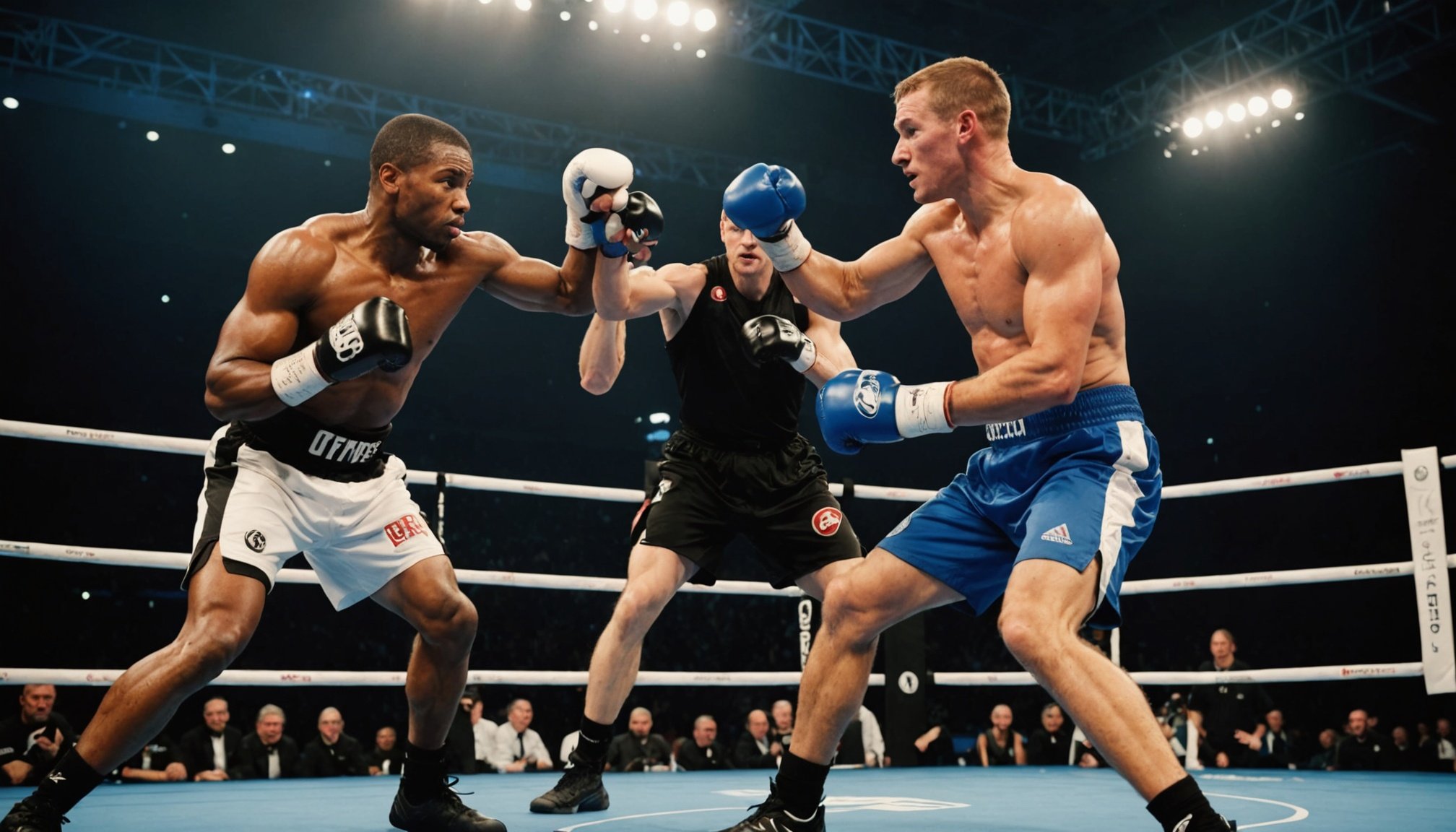Exploring Post-Career Journeys: Popular Career Options for Retired Combat Sports Athletes in the UK
When elite athletes hang up their gloves or step out of the ring for the last time, they often face a daunting question: what’s next? For many retired combat sports athletes in the UK, the transition to a new career can be both challenging and rewarding. Here, we delve into the various paths these athletes can take, highlighting some inspiring examples and practical advice.
Transitioning to New Careers: The Challenges and Opportunities
Retiring from professional sports, especially combat sports like boxing, mixed martial arts (MMA), and wrestling, is a significant life change. Athletes must adapt to a new routine, often without the structured schedule and physical demands they were accustomed to.
Additional reading : What role does community support play in the journey of a combat athlete?
Mental Health and Support
One of the critical aspects of post-career life is mental health. The sudden absence of the adrenaline rush and the sense of purpose that comes with competing can lead to feelings of emptiness and depression. Heather Hardy, a former world champion boxer, shared her struggles with mental health after her career was cut short due to a life-threatening injury:
“It’s similar to dealing with an injury; you just push through it. But the last two months have been about bouncing back and learning to live in this new reality,” Hardy explained, highlighting the ongoing battle with health issues and the emotional toll of leaving the sport behind.
Also to see : How can participating in martial arts seminars benefit a fighter’s skill set?
Support from family, friends, and mental health professionals is crucial during this transition. Many athletes find solace in speaking openly about their experiences, helping to break the stigma around mental health in sports.
Coaching and Mentoring
One of the most natural transitions for retired combat sports athletes is into coaching or mentoring. This career path allows them to stay involved in the sport they love while sharing their expertise with the next generation.
Example: Chris Eubank
Chris Eubank, a former world champion boxer, is an excellent example of an athlete who has remained closely tied to the sport. Although he does not actively coach, his son, Chris Eubank Jr., has followed in his footsteps, and Eubank Sr. often provides guidance and support. This familial connection keeps him engaged with the boxing world.
Practical Advice
For athletes considering coaching, here are some key points to keep in mind:
- Qualifications: Obtain relevant coaching certifications to enhance credibility and skills.
- Networking: Build relationships with current coaches, trainers, and athletes to stay updated on the latest techniques and opportunities.
- Patience: Coaching is a long-term commitment; be prepared to invest time in developing young athletes.
Broadcasting and Media
Another popular career path for retired athletes is in broadcasting and media. Their experience and insights make them valuable commentators, analysts, and presenters.
Example: Derek Jeter
While not a combat sports athlete, Derek Jeter’s transition into media is a compelling example. After retiring from baseball, Jeter founded The Players Tribune, a media company that allows athletes to share their stories directly with fans. This platform has become a significant voice in the sports world, showcasing the versatility of athletes in media roles.
Broadcasting in Combat Sports
In the UK, retired boxers like Richie Woodhall and Johnny Nelson have successfully transitioned into broadcasting. They provide expert analysis and commentary for major boxing events, leveraging their in-ring experience to engage audiences.
Entrepreneurship and Business
Many retired athletes have a natural flair for entrepreneurship, using their fame and skills to launch successful businesses.
Example: John Elway
John Elway, a former NFL quarterback, is a prime example of an athlete who has excelled in business. After retiring, Elway ventured into various businesses, including restaurants and car dealerships. He also returned to the NFL as the Executive Vice President of Football Operations for the Denver Broncos, demonstrating his ability to navigate different business environments.
Table: Successful Business Ventures by Retired Athletes
| Athlete | Business Venture | Description |
|---|---|---|
| John Elway | Restaurants and Car Dealerships | Successfully managed and owned several restaurants and car dealerships. |
| Brant Reeves | Cattle Ranch | Owns a 300-acre cattle ranch in Oklahoma. |
| Detlef Schrempf | Wealth Management | Works as a business development officer for Coldstream Capital Management. |
| Vin Baker | Starbucks | Worked as a barista after losing his NBA fortune. |
| Trish Stratus | Yoga Studio | Founded Stratusphere, Canada’s largest eco-friendly yoga studio. |
Philanthropy and Community Work
Many athletes find fulfillment in giving back to their communities through philanthropic work.
Example: Bryan Fletcher
Bryan Fletcher, a former ski jumper and cancer survivor, co-founded a charity to help young people who have survived cancer. His personal experience and resilience have inspired many, and his charity work continues to make a significant impact.
Practical Advice
For athletes interested in philanthropy:
- Identify Your Passion: Focus on causes that resonate with your personal experiences and values.
- Build Partnerships: Collaborate with existing organizations to amplify your impact.
- Engage Locally: Start with local community projects to build a strong foundation.
Health and Wellness
Given the physical demands of combat sports, many athletes transition into careers related to health and wellness.
Example: Trish Stratus
Trish Stratus, a former WWE champion, opened Stratusphere, a yoga studio in Toronto. This venture not only keeps her connected to the fitness world but also allows her to promote a healthier lifestyle.
Table: Health and Wellness Ventures by Retired Athletes
| Athlete | Health and Wellness Venture | Description |
|---|---|---|
| Trish Stratus | Yoga Studio | Founded Stratusphere, Canada’s largest eco-friendly yoga studio. |
| Heather Hardy | Coaching at Gleason’s Gym | Coached at Gleason’s Gym before her health issues forced her to stop. |
| Vin Baker | Public Speaking on Health | Shares his story of overcoming addiction and financial loss to promote health awareness. |
Education and Administration
Some athletes choose to pursue careers in education or sports administration, leveraging their experience to shape the next generation of athletes.
Example: Olympic Committee Roles
Olympic athletes often find roles within the Olympic Committee or other sports governing bodies. These positions allow them to contribute to the development of their sport on a global stage.
Practical Advice
For athletes considering roles in education or administration:
- Further Education: Pursue degrees or certifications in sports management, education, or related fields.
- Networking: Build relationships with current administrators and educators to understand the landscape.
- Volunteer: Start by volunteering or interning in these roles to gain practical experience.
Mixed Martial Arts and Other Combat Sports
Athletes from mixed martial arts (MMA) and other combat sports also have a variety of career paths available.
Example: Spike Dudley
Spike Dudley, a former WWE wrestler, transitioned into a career as a financial adviser with MassMutual. This unexpected shift highlights the versatility of athletes in adapting to new careers.
The journey after retiring from combat sports is filled with opportunities and challenges. Whether it’s coaching, broadcasting, entrepreneurship, philanthropy, or health and wellness, there are numerous paths that athletes can take.
Key Takeaways
- Stay Connected to the Sport: Many athletes find fulfillment in roles that keep them involved in their sport.
- Leverage Your Network: Use your connections to explore different career opportunities.
- Focus on Mental Health: Prioritize mental well-being during the transition period.
- Be Open to Learning: Pursue further education or training to enhance your skills in your chosen career.
For retired combat sports athletes, the key to a successful post-career journey is finding a path that aligns with their passions, skills, and values. By doing so, they can continue to make a meaningful impact both inside and outside the sport they love.











